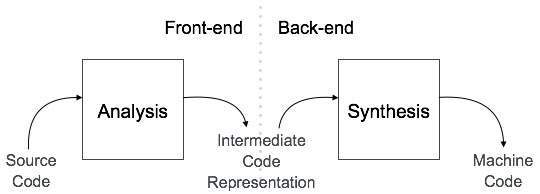
- Compiler Design Tutorial
- Compiler Design - Home
- Compiler Design - Overview
- Compiler Design - Architecture
- Compiler Design - Phases of Compiler
- Compiler Design - Lexical Analysis
- Compiler - Regular Expressions
- Compiler Design - Finite Automata
- Compiler Design - Syntax Analysis
- Compiler Design - Types of Parsing
- Compiler Design - Top-Down Parser
- Compiler Design - Bottom-Up Parser
- Compiler Design - Error Recovery
- Compiler Design - Semantic Analysis
- Compiler - Run-time Environment
- Compiler Design - Symbol Table
- Compiler - Intermediate Code
- Compiler Design - Code Generation
- Compiler Design - Code Optimization
- Compiler Design Useful Resources
- Compiler Design - Quick Guide
- Compiler Design - Useful Resources
- Selected Reading
- UPSC IAS Exams Notes
- Developer's Best Practices
- Questions and Answers
- Effective Resume Writing
- HR Interview Questions
- Computer Glossary
- Who is Who
Compiler Design - Architecture
A compiler can broadly be divided into two phases based on the way they compile.
Analysis Phase
Known as the front-end of the compiler, the analysis phase of the compiler reads the source program, divides it into core parts and then checks for lexical, grammar and syntax errors.The analysis phase generates an intermediate representation of the source program and symbol table, which should be fed to the Synthesis phase as input.

Synthesis Phase
Known as the back-end of the compiler, the synthesis phase generates the target program with the help of intermediate source code representation and symbol table.
A compiler can have many phases and passes.
Pass : A pass refers to the traversal of a compiler through the entire program.
Phase : A phase of a compiler is a distinguishable stage, which takes input from the previous stage, processes and yields output that can be used as input for the next stage. A pass can have more than one phase.
